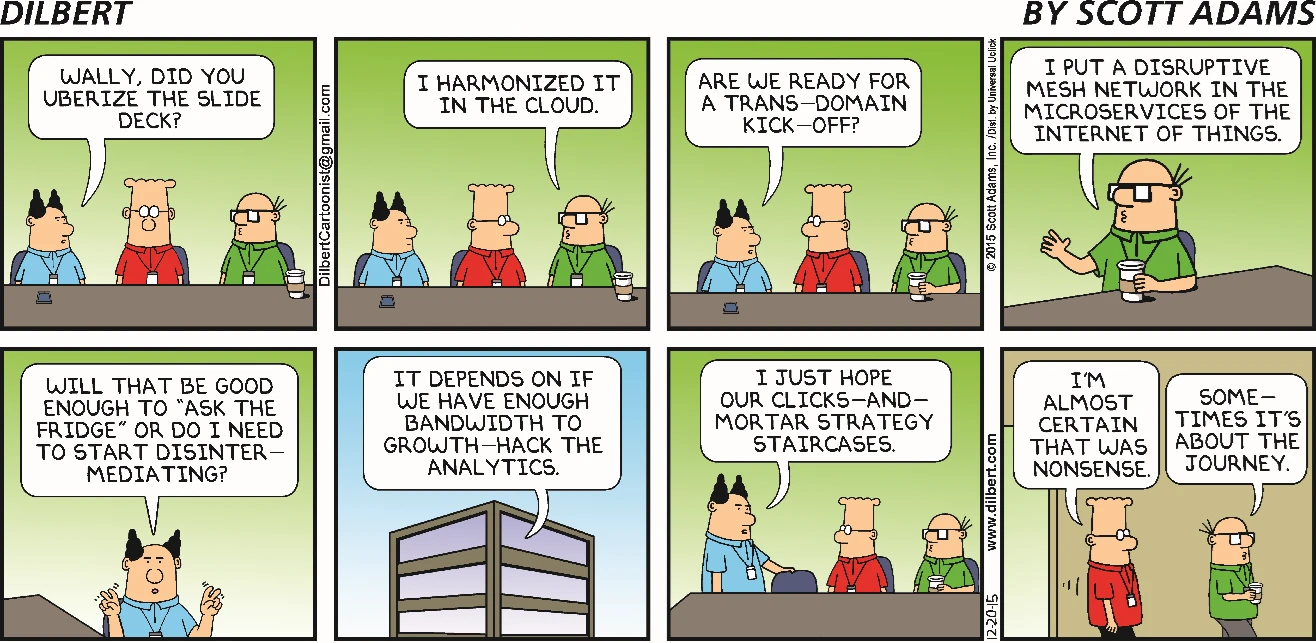
“If you can’t dazzle them with brilliance,” goes the old saying, “baffle them with bulls***.”
A scan of almost any business communication — printed material, email, job descriptions, even social media — shows an undue reliance on buzzwords, AKA bulls***.
Photo Credit: LinkedIn
People use buzzwords to sound important, blur meaning, or simply navigate a conversation while on mental autopilot. I think all of us have done this at one time or another.
Speaking and writing in plain English can become more difficult in technical fields, such as ours. But that makes it even more important for utility communicators to write and speak in ways that are understandable to the general public! Don’t be afraid to ask an engineer in your utility, “what does that mean?”

Credit: DILBERT © Scott Adams. Used By permission of ANDREWS MCMEEL SYNDICATION. All rights reserved.
The danger of buzzwords and corporate-speak was dramatized to me recently when I was speaking with a consultant specializing in information technology. He loaded the conversation with so many acronyms, buzzwords, and other forms of piffle that when there was a break in the conversation, I said I didn’t think I was qualified to write the piece he was seeking.
One of the things that makes buzzwords so dangerous is that they can mean different things to different people — if they mean anything at all. That complicates communication. Consider the word, “rich,” which has crept into business communications like a thief in the night. Rarely is that word used as a synonym for “wealthy” or “opulent.” Instead, often it is used sarcastically (as a synonym for “ironic” or “ridiculous”), or favorably (“the plan is rich with detail”). A word with many meanings is, effectively, meaningless, no different from the word “interesting,” which can mean “deep,” “new,” “unusual,” “thoughtful,” silly,” “vile,” “unpleasant,” and many other things.
Communications Tip of the Month: This year, don’t try to “boil the ocean.” Give up on plans to “growth-hack the analytics.” Above all, refrain from “triangulating” anything. Speak and write in crisp, clear English so your customers and employees understand exactly what you mean.
My New Year’s resolution is to redouble my efforts to use plain, easily understood English in all communications. Maybe you’d like to join me? It’s not the first time I have adopted that resolution, and I doubt it will be the last. But it is worth making!
This doesn’t have to be a dreary, self-improvement exercise. There’s plenty of ways to make this fun! Check out how The Atlantic magazine created a buzzword bracket like the NCAA’s spring basketball tournament bracket, where buzzwords were pitted against each other: “ping” vs. “hop on a call,” and “circle back” battled “touch base.”
It’s easy to find “buzzword bingo cards” on the internet, such as here, and here. And there are plenty of buzzword generator sites, too, like here, where with the push of a button, nonsense phrases like “future-proofed executive adapter,” or “disintermediate back-end interfaces” can be summoned.
Have a chuckle, but then redouble your efforts to root out buzzwords and overly technical language from your thoughts, speech, and writing.
Below is a table I put together with 13 common buzzwords, their translation, and suggestions for better terms.
| Meaningless Term | Translation | Suggested Alternative |
| Circle back | Revisit, discuss again | Discuss again |
| Pivot | Shift, alter significantly | Change or shift |
| Double Click | Provide more detail | Could you provide more detail? |
| Low-hanging fruit | Easily captured | Easily captured |
| Outside the box | New, fresh, different | Fresh |
| Lean in | Try harder; focus more | focus more |
| Land on | Get to a conclusion | Conclude |
| Lane | Your function or expertise | Your expertise |
| Deep dive | A thorough exploration | A thorough exploration |
| Unplug/off the grid | No email/texts | Take time off |
| Move the needle | Improve; get better results | Improve |
| Vision-casting | Big picture; goal setting | Our desired end state |
| All in | Emotionally invested | Emotionally invested |
When discussing buzzwords, I often refer to George Orwell’s classic essay, “Politics and the English Language,” where he shared six tips for keeping your content piffle-free:
- Never use a metaphor, simile, or other figure of speech which you are used to seeing in print.
- Never use a long word where a short one will do.
- If it is possible to cut a word out, always cut it out.
- Never use the passive where you can use the active.
- Never use a foreign phrase, a scientific word, or jargon if you can think of an everyday English equivalent.
- Break any of these rules sooner than say anything outright barbarous.
Promise yourself to prune the piffle from your prose!
_________________________________________________________________

Did You Know?
Numerous companies in and around the electric, gas and water industry have turned to EEC’s John Egan, an experienced content strategist, to develop high-quality content for their newsletters, websites, and annual reports in a timely manner.
Many of these clients cite John’s unique expertise in creating strategic content that speaks to their specific readers, customers, employees, and other stakeholders. His extensive knowledge of current industry events and challenges and deep network of trusted sources are hard to find anywhere else!

